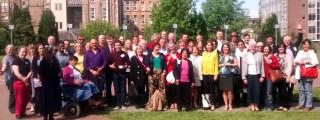The Second International Conference on Barriers and Enablers to Learning Maths follows the highly successful 2015 conference (see photo below). Mathematics should be understood in the widest possible sense to cover all aspects of mathematics, including number, pure mathematics, applied mathematics, statistics and the full range of applications of mathematics.
The conference examines learning and teaching throughout the life span, from the most basic to the most advanced topics and for the full range of learners, including people with dyscalculia and other maths learning difficulties, gifted learners, mathematicians and 'traditional' learners. This should lead to crossfertilisation between different areas of learning and teaching. The conference is also highly interdisciplinary. In addition to mathematicians, it should be of interest amongst others to psychologists, teachers, pedagogical and educational experts, engineers, scientists and social scientists. The conference is intended for all sectors of education and school based teachers and specialists are most welcome both to attend and participate either on one of the themed days or for the three day duration.
Keynote speakers:
- Scott Keir, Head of Education and Stastical Literacy, Royal Statistical Society: Why statistical literacy matters
- Annemie Desoete, Professor of Learning Disabilities, Ghent University & Artevelde University College: Barriers and Enablers to Learning Maths, even more important in the case of maths learning difficulties'
- Peter Bryant, Head of Innovation, LSE: A design for learning: Re-imagining maths learning, teaching and assessment for a digital age
- Ingvar Stahl, University of Helsinki: Why interdisciplinary math is not fun but interesting indeed?
- Jeremy Hodgen, University of Nottingham
For information on the first conference see: http://www.ima.org.uk/conferences/conferences_calendar/barriers_and_enab... s.cfm.html
Thematic sessions and proposals for working sessions are invited to the following four conference tracks:
- Motivation and maths anxiety
- Inclusive practice and learners’ particular requirements
- Effective practice - what does and does not work
- The use of technology to support learning, teaching and interaction between students and students and teachers.
Proposals for special thematic sessions:
- One-page session description
- Brief bio(s) of the session chair(s)
- You should aim to submit this as soon as possible, as accepted special thematic sessions will be posted on the website.
- Proposers of special thematic sessions which result in the acceptance of at least four papers with registered authors will have a reduced conference fee.
Proposals for working sessions:
The working sessions will lead to the development of working groups and/or recommendations on particular topics related to the conference themes. Proposals should include the following:
- A two-page description of the proposed topic with an explanation of its importance
- Brief bio(s) of the session chair(s).
Maths Educational Films, Posters and Tutorials: Authors wanting to present short educational films, posters, tutorials or other types of contribution should contact [email protected]
Key Dates: Rather than a single submission date, there is a series of submission dates for extended abstracts, proposals for invited and working sessions and maths educational films. Decisions will be notified a month after each date.
Submission dates:
- Monday 25 September 2017
- Monday 27 November 2017
- Monday 29 January 2018
- Monday 26 March 2018
Enquiries: To be added to the mailing list (if you are not already on it), for additional information and questions please contact - [email protected]
Conference Chairs: Dr Marion Hersh, University of Glasgow Dr Meena Kotecha, LSE
Conference web site: http://www.gla.ac.uk/schools/engineering/research/divisions/biomedical/s...
best Running shoes brand | Nike Air Max
- Log in to post comments














Latest Comments